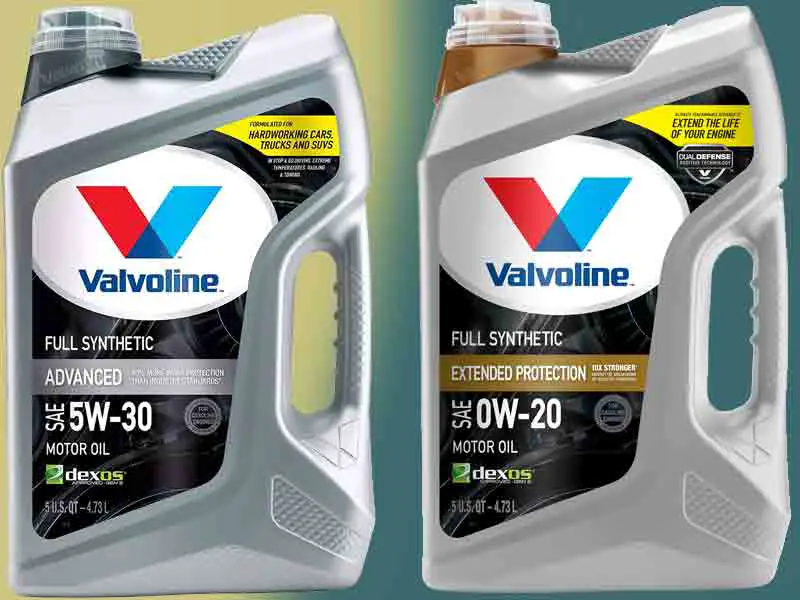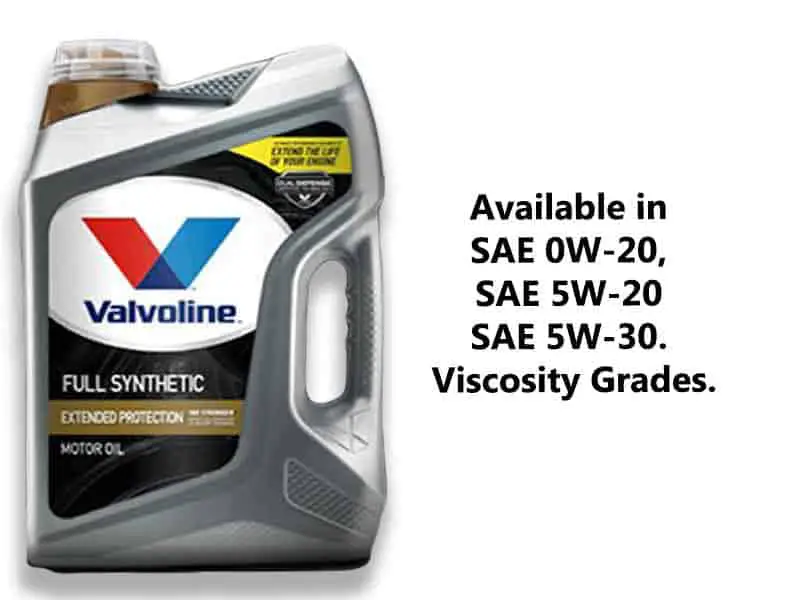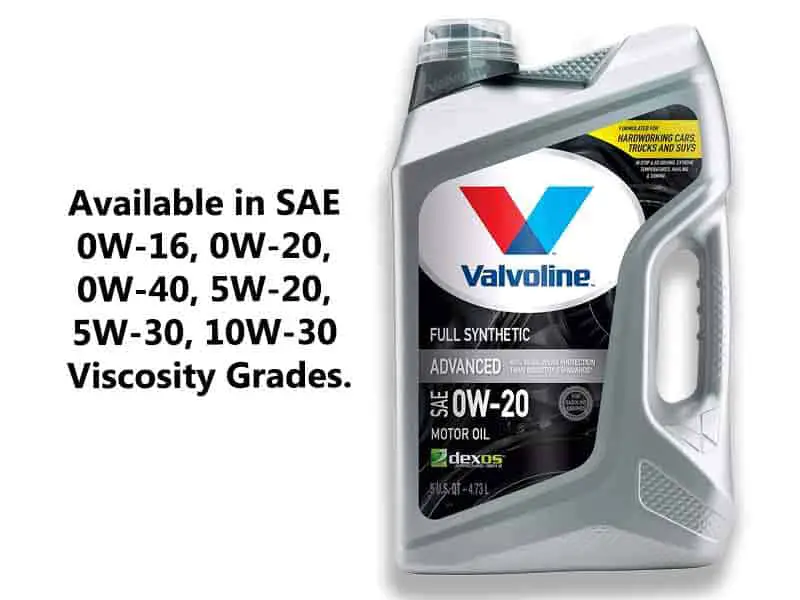Despite some imperfections, these two engine oils are one of the best choices out there because of their extremely low prices. Using our detailed analysis of both engine oils, you can make your own decision for your oil purchase.
However, we recommended you the Valvoline Extended Protection over the Valvoline Advanced because it uses the latest Valvoline formula and as the name suggests, provides much better protection against engine wear, heat and deposits compared to the Valvoline Advanced while the difference in their price is minimal.

Formulated with an advanced additive technology, it can undergo severe conditions such as extreme heat, engine stress, etc. without an issue.
It comes in four viscosity grades: 0W-16, 0W-20, 5W-20, 5W-30, and 10W-30.
The Valvoline Advanced is specifically designed to provide better protection against sludge build-up and increase the fuel economy of the vehicle.
Compare Valvoline Advanced with Pennzoil Full Synthetic Oil
Valvoline Extended Protection is a premium quality motor oil that promises the best engine protection. It is a fully synthetic engine oil with top-notch anti-wear additive technology.
As the name suggests, this engine oil is specifically made to protect the engine and extend its life to the maximum. It comes in three viscosity grades: 0W-20, 5W-20, and 5W-30.
Table of Contents
Valvoline Advanced vs Valvoline Extended Protection
| Specs | Valvoline Advanced | Valvoline Extended Protection |
| Oil Type | Full Synthetic | Full Synthetic |
| Engine Type | Gasoline/Diesel | Gasoline/Diesel |
| Viscosity Grade | SAE 0W-16, 0W-20, 0W-40, 5W-20, 5W-30, 10W-30 | SAE 0W-20, SAE 5W-20 SAE 5W-30. |
| API | SP / SN PLUS / SN | SP / SN PLUS / SN |
| ILSAC | GF-6A | GF-6A |
| Oil Change Frequency | 3000 to 4000 miles | 7500 to 10000 miles |
| Additives Used | Innovative anti-wear additives, Dispersant additives, Detergents, Superior antioxidants. | Anti-wear additives, Dispersants, Detergents, Superior antioxidants |
Valvoline Advanced and Valvoline Extended Protection Comparison:
Viscosity Comparison
Every motor oil you buy has a code written on its label. This code represents the viscosity grade of that engine oil

The code contains two numbers and the letter ‘W’. The first number stands for the viscosity of the motor oil at cold temperatures.
The W written next to it stands for winter hence hinting at cold temperatures.
The second number represents the viscosity of the motor oil at high temperatures.

So, if an engine oil has a viscosity grade of 10W-30, it means it has a viscosity of 10 at cold temperatures and a viscosity of 30 at high temperatures.
The Valvoline Advanced engine oil comes in five viscosity grades:
0W-16, 0W-20, 0W-40, 5W-20, 5W-30 and 10W-30.
Meanwhile, the Valvoline Extended Protection engine oil comes in three viscosity grades: 0W-20, 5W-20, and 5W-30.
Our Pick: Valvoline Advanced!
Valvoline Advanced has a lot more options available in terms of viscosity grade.
Oil Type
The oil type of any engine oil is determined by the base oil as it makes up 80 percent of the motor oil. The other 20 percent are the added additives. Depending upon your vehicle’s engine, you would need a specific type of engine oil. It can be a conventional, synthetic-blend, or full synthetic.
The Valvoline advanced is a fully synthetic motor oil which means it is fully processed and prepared artificially in the laboratories. It can clean sludge build-up effectively due to advanced detergent additives present.
On the other hand,Valvoline Extended Protection is also a fully synthetic motor oil. Like all synthetic oils, it can provide excellent engine protection and help increase fuel economy.
Why Synthetic Oils are better than Conventional Oils?
Synthetic motor oils are way better than conventional motor oils. Conventional oils are chemically less stable and can lose their protective capabilities relatively quickly due to oxidization. On the other hand, synthetic oils are specially developed containing advanced additives to help protect your engine against wear, sludge, oil breakdown, etc. They also provide better fuel economy and longer oil change intervals compared to conventional oils.
Additives
Every motor oil company has a specified formula they use in terms of additives. Their motor oils usually have the same additives but in different proportions and combinations. The case of these two Valvoline engine oils is no different. They both have the same types of additives present in them.
Valvoline Advanced uses Innovative anti-wear additives, Dispersant additives, Detergents, Superior antioxidants. The super antioxidant additives present in the Valvoline Advanced provide exceptional resistance against oil breakdown.
The extra detergent additives help protect the engine against sludge build-up.
Valvoline ExtendedProtection also has Anti-wear additives, Dispersants, Detergents, Superior antioxidants. It uses an additive booster technology for better protection against deposits.
Engine Wear Off Protection
Synthetic oils are known for their protective powers against wear-offs in engines. The Valvoline engine oils are no exception. Take a look at this breakdown of anti-wear additives present in both engine oils to protect the engine.
Valvoline advanced engine oil uses two anti-wear additives, Phosphorous and Zinc.
All the different viscosity grade variants of the Valvoline Advanced have the same proportion of Phosphorous and Zinc present in them except the SAE 0W-16.
It provides excellent anti-wear protection to the engine specifically in tough conditions like extreme temperatures, stops and go driving, etc.
| Anti-wear additives (In ppm) | 0W-16 | 0W-20 | 5W-20 | 5W-30 | 10W-30 |
| Phosphorous | 760 | 800 | 800 | 800 | 800 |
| Zinc | 850 | 940 | 940 | 940 | 940 |
Valvoline Extended Protection engine oil also uses the same two anti-wear additives.
All the variants having different viscosity grades use the same amount of Zinc and Phosphorous in them as an anti-wear additive.
It is formulated to provide 50% better protection to the engine compared to the industry standards.
It also provides enhanced cold-start protection to the engine.
| Anti-wear additives (In ppm) | 0W-20 | 5W-20 | 5W-30 |
| Phosphorous | 800 | 800 | 800 |
| Zinc | 940 | 940 | 940 |
Our Pick: Both!
The amount of Zinc present in the two engine oils is perfect. Most people believe that the higher the amount of zinc in engine oil, the better protection it provides to the engine which is a completely false narrative.
The high amount of zinc in engine oil can damage the catalytic converter in a vehicle and also cause corrosion in the engine.
The amount of Zinc should be moderate and mixed with Phosphorous in calculated proportions to provide the best engine wear protection.
Sludge Build-Up Protection
The detergent additives present in motor oil are responsible for cleaning deposits and protecting the engine against sludge build-up.
Following detergent, additives are present in the Valvoline Advanced:
| Detergents | 0W-16 | 0W-20 | 5W-20 | 5W-30 | 10W-30 |
| Calcium | 1145 | 1145 | 1145 | 1145 | 1145 |
| Magnesium | 844 | 844 | 844 | 844 | 844 |
Valvoline Extended Protection:
| Detergents | 0W-20 | 5W-20 | 5W-30 |
| Calcium | 1145 | 1145 | 1145 |
| Magnesium | 844 | 844 | 844 |
It is quite clear that both the engine oils use the same proportions of Magnesium and Calcium for cleaning the engine.
Both engine oils also use a fortified detergent system that promises 25 percent better sludge build-up protection compared to other engine oils. You can trust any of the two engine oils for the reduction of sludge.
Our Pick: Both!
Engine Seals Protection
It is upon the engine oil to help protect the engine seals. The detergent additives present also protect the engine oils from leakage.
The Valvoline Advanced engine oil provides decent protection against engine leaks by using detergent additive boosters, but the Valvoline Extended Protection is better. Its innovative formula has premium seal conditioners present in it that restore any broken seals and further protect the engine from leakage.
Our Pick: Valvoline Extended Protection!
Oil Change Frequency
Synthetic engine oils are known for providing better oil change frequency compared to conventional engine oils because they have superior chemical as well as mechanical properties.
Valvoline Advanced provides an oil change frequency somewhere between 3000 and 4000 miles which is not that impressive considering it’s a synthetic engine oil.
Valvoline Extended Protection provides an oil change interval of 7500 to 10000miles. Some people take it up to 15000 miles as well without a problem but we don’t recommend it. It is clearly the better engine oil in terms of oil change intervals.
Our Pick: Valvoline Extended Protection!
Oil burn-off Protection
Oil burn-offs usually occur in extremely hot temperatures. Compared to conventional or synthetic blend motor oils, synthetic motor oils will shield your vehicle from oil burn-offs much better.
The Valvoline Advanced engine oil has the defensive oil burn-off prevention capability but we found out that it can cause oil burn-offs in vehicles where constant engine leaks are already an issue.
The Valvoline Extended Protection offers 10 times better oil burn-off protection compared to the Valvoline Advanced engine oil or any other engine oil available in the market.
Our Pick: Valvoline Extended Protection!
Catalytic Converter Performance
High amount of Phosphorous in any engine oil is known to damage the catalytic converter of the vehicle.
Both of the engine oils have high amounts of Phosphorous present in them thus they can cause damage to the vehicle’s catalytic converter in the long run.
If you are worried about that, you can look for some other engine oil with less proportion of Phosphorous present in it.
Our Pick: None!
Fuel Economy
Fuel economy of a vehicle is increased when there is little to no sludge build-up in the engine.
Synthetic motor oils provide excellent fuel economy because they have more lubricating properties compared to conventional oils, which means the viscosity of the oil remains thin.
Low viscosity of the oil means the vehicle covers more distance while using less fuel i.e., it uses fuel efficiently.
Both of the Valvoline engine oils win in this regard because they provide superb fuel economy.
Our Pick: Both!